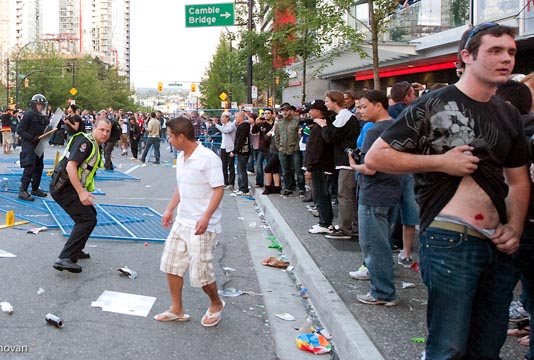Many will roll their eyes and view this article title as just another attempt to blame the U.S. empire for every outburst of violence across the globe. However, the post-Stanley Cup Final trashing of downtown Vancouver is a manifestation of what has become the normal popular response to contemporary capitalism’s behaviour. In this instance, the corporate media hype around the playoffs, NHL manipulation of the series, local on-site liquor vendors’ fuelling of the crowd, and the assuredly pre-ordained defeat of the Canucks led to the ensuing post-defeat looting of the high-end chain stores and the trashing of cop cars. As we have seen increasingly across the globe, this event was simply a local manifestation of frustration and anger generated by contemporary capitalism as practiced and lived in this outpost of empire.
The Canadian capitalist class has bought into this structure through its decision to become a junior partner of U.S. capitalism. Canadian capitalism has historically preferred this comprador role in imperialism, first Britain, now with the U.S., albeit with short-lived, limited attempts at creating an autonomous capitalist state, most recently during the Trudeau/Liberal era. This last nationalist interlude came to an end with the signing of the Canada-US free trade agreement by the Mulroney-Conservative government in 1989 (led by a man whose family roots were in the branch-plant economy). Since then, the incorporation of the Canadian political-economy into that of the U.S. has continued apace with the gradual merging of investment, production and sales markets, elimination or harmonization of domestic regulatory environments and foreign policy. Canadian capital’s accordance with absorption into the American empire is reflected in its decisive abandonment of the Liberal Party (and its legacy of populist nationalism) and adoption of the Harper-led cheerleaders of empire.
The recent history of the National Hockey League mirrors this evolution of Canadian business. The process started in the 1960s and 70s when its instinctual capitalist desire for monopoly led it, first, to expand its brand in the U.S. to counter the market challenge from the WHA and, then, to its merger and absorption of its would-be rival. This victory spurred its ambitions, especially among its newer American team owners, to become an equal to the other major American professional sports leagues. To this end it determined to expand its presence into every major U.S. urban market, hiring a former NBA vice-president to see to its successful achievement.
As the new NHL Commissioner, Gary Bettman was mandated to complete the league expansion (through moving the smaller market Canadian teams to the new sun-belt locations), substantially increase league revenues (by signing a lucrative broadcasting contract with a major U.S. TV network), and rolling back the players increasing collective bargaining power. Through a season-long lockout and salary caps; Bettman is a corporate labour relations lawyer by training and practice. The realization of these goals entailed the “Americanization” of the league, the market, and the game.
The Canadian owners became a marginal voice in the Board of Governors, which forced the more profitable Canadian teams to perennially subsidize the money-losing sun belt teams. The game was changed to suit American commercial interests and perceived audience tastes: commercial breaks took priority over the on-ice play, gratuitous violence became a major marketing tool for the new non-hockey culture audience, the rules of the game were changed to make it faster, more dangerous and higher scoring to retain audience attention, and game commentary became more overtly violent, misogyntist, and zenophobic (“the wimpy Sedin sisters”). The game has become a rink-based version of professional wrestling or, perhaps more accurately, ultimate fighting.
The Canadian foundations of the game were wholly abandoned (except for the work-force which is still predominantly Canadian raised), so much so that no Canadian team has been able to win the Stanley Cup since the 1990s corporate strategy shift. The mere presence of Canadian teams in the playoffs reduced the U.S. TV audience share and hence broadcaster and league revenues. Consequently, when, despite the odds, a 2010-11 season-leading Canada-based team looked likely to win the playoffs, NHL headquarters reacted, first by intervening in the officiating to extend each series to as close to seven games-shows as possible and, then, to connive in critically disabling the Vancouver team (Boston helped their cause by signing the son of the NHL executive in charge of officiating to the Bruins roster).
During the Canucks doomed run at the Cup, the Canadian mass media and politicians fired up Canadian patriotic fervour (wrapping themselves in the flag to mask their own perfidy). The pre-ordained defeat, by hook and by crook, led to the ensuing release of pent-up popular frustration and anger at the loss of the series, exacerbated by the underlying sense of the continuing loss of control over our national sport, all in the context of the more consequential associated loss or, better, surrender of our national economic and political sovereignty to empire (ever more galling, an empire in decline). This hockey series has to be seen in the context of encompassing developments in order to understand why so many people in Vancouver and British Columbia, and across the country (we have to excuse our domestic corporate media who followed their class brothers into the imperial camp long ago) put all of their hopes, at least temporally, behind their beloved Canucks run at former Canadian Governor-General Lord Stanley’s Cup.
David Murphy was a proud member of the Canadian Union of Postal Workers for 13 years before completing a completing a PhD in Political Science at the University of British Columbia. He currently resides in Bloomington, IN, with his wife. He is a teacher and has published articles in various labour, poli sci, education academic journals as well as being the former editor and writer for the “Vancouver Postal Worker” of CUPW.



